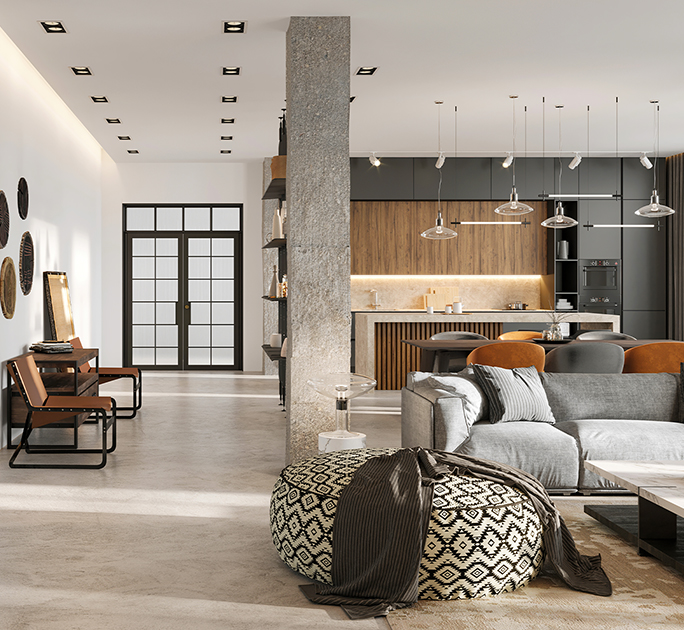By Jermaine Koh
![]()
If you’ve only got a minute:
- Buying a home offers long-term stability and investment potential while renting provides flexibility and higher liquidity.
- Assess your financial capacity, including the ability to afford upfront costs and ongoing expenses for homeownership.
- Factor in your future plans and lifestyle preferences when considering whether to buy or rent a home.
![]()
In 2024, Singapore’s property market saw contrasting shifts across rental and purchases. As we move further into 2025, the rental market is easing from its previous highs into steadier growth, while the purchase market continues to inch upward, although property purchases are seen to be cautious driven by an uncertain economic environment.
Whether you’re a potential homeowner considering a major investment or a tenant who values flexibility, understanding the main differences between owning and renting is essential to make the best housing decision based on your situation.
Rental market outlook
Private residential rents stabilised in late 2024, after nearly a 2% annual decline, before rebounding modestly in early 2025 with increases of 0.4% in Q1 2025 and 0.8% in Q2 2025.
HDB rentals also showed growth, supported by rising rental and more flats leased in Q1.
Looking ahead, economic uncertainties such as slower expat hiring may temper rental demand, especially in the private sector. However, a tightening supply of completed homes combined with easing interest rates may help to cushion any sharp declines in rental prices.
Industry experts generally expect Singapore’s reputation as a stable and attractive market, especially amid global economic uncertainties, to continue to draw demand for rental properties – particularly high-end homes in prime locations.
As new completions remain low in key districts, landlords can potentially expect steady rental growth over the next 2 years.
Home purchase market outlook
Singapore’s home purchase market remains resilient, though growth has moderated in recent months. Private residential property prices rose by about 1% in Q2 2025, continuing steady gains from earlier quarters.
URA noted that landed homes outperformed other segments, with stronger price growth compared to non-landed properties. The Core Central Region (CCR) saw the most notable rise, with prices up around 3%, reflecting strong demand amid limited new supply.
Public housing resale prices continue to hold firm. The HDB resale price index increased by approximately 0.9% in Q2 2025, indicating steady demand despite a slower pace compared to previous quarters. Resale transaction volumes also rose slightly, showing ongoing buyer interest.
Looking ahead, industry experts expect modest private housing price growth of 3-4% for 2025. This outlook is supported by limited new supply in desirable areas and consistent buyer interest. Cooling measures and interest rate pressures are also helping to temper speculative demand, promoting a more balanced market outlook.
In the HDB segment, demand is anticipated to stay robust due to limited BTO supply and ongoing affordability considerations. While resale price growth may be slow, public housing continues to play a vital role in Singapore’s housing landscape.
Ultimately, the decision to buy or rent a home in Singapore is influenced one’s personal financial situation, lifestyle, and long-term goals.
Here are the pros and cons of each option.
Buying: Building wealth and stability
Pros | Cons |
|---|---|
Long-term security and stability | High upfront costs (down payment, stamp duty, etc.) |
Potential property appreciation | Long-term financial commitment (25-30 year mortgage) |
Building wealth through equity | Market volatility risks |
Potential retirement income source | Maintenance and repair responsibilities |
Freedom to personalise and renovate | Eligibility restrictions (especially for HDB flats) |
Legacy for future generations | Less flexibility to relocate |
Protection against rent increases | Property taxes and insurance costs |
Potential rental income | Potential for negative equity if property values decline |
Homeownership provides stability for families, allowing children to grow up in a consistent environment. It also offers financial benefits such as protection against rent increases and the potential for rental income. You can also renovate, design and personalise your home as you wish.
For retirees, a home is a valuable asset, providing options for income through renting out the home or rooms, right-sizing to a smaller home or selling a portion of the lease back to the government via the lease buyback programme.
However, the decision to buy a home comes with significant challenges such as high upfront costs, long-term financial commitment, market volatility risks and potential eligibility restrictions. You should carefully evaluate your personal circumstances, financial capabilities and long-term goals before committing to buying a home.

Renting: Freedom and flexibility
Renting a house comes with its own set of advantages that can make it an appealing option for many people.
Pros | Cons |
|---|---|
Lower initial financial outlay | Lack of wealth creation through property ownership |
Flexibility to move or change locations | No equity building |
Avoid maintenance and repair costs | Potential for regular rent increases |
Predictable monthly expenses | Housing insecurity (lease non-renewal, property sale) |
Access to areas you might not afford to buy | Limited control over property modifications |
No exposure to property market risks | Missing out on potential property appreciation |
Renting offers financial flexibility, higher liquidity and reduced responsibilities, providing easier access to housing with lower initial costs and the ability to relocate easily. You can avoid maintenance fees and enjoy more predictable monthly expenses, making it an attractive option, especially if you value mobility.
However, renting comes with significant long-term drawbacks, including no wealth creation, potential housing insecurity and missed opportunities for property appreciation. The lack of equity building and vulnerability to rent increases make renting less financially advantageous compared to homeownership.

Comparison of buying vs renting a 4-bedroom HDB flat in Bishan
Rent
Renting | |
|---|---|
One-off costs | S$7,000 |
Deposit (usually 1 to 2 months) |
|
|
|
Recurring costs |
|
Rent | S$3,500 |
The median rental price of S$3,500 represents only the base monthly rent. This figure does not include additional living expenses.
These supplementary costs can vary significantly depending on your lifestyle, personal preferences, and consumption patterns. You should factor in these potential variations when budgeting for rental accommodation, as they can materially increase the total monthly housing expenditure.
Buy
Property price: S$730,000 (Q32024 4-room HDB flat median resale price)
Buying | |
|---|---|
One-off costs |
|
Downpayment (25% of property value) | S$182,500 HDB loan: Cash and/or CPF Bank loan: 5% downpayment in cash only |
Recurring costs |
|
Mortgage repayment (assuming interest is 3.75% p.a. and 25 years bank loan tenure) | S$2,815 |
It is important to note that the monthly mortgage repayment (bank loan) of S$2,815 represents only the base loan repayment and does not include additional homeownership expenses.
Legal fees, stamp duty, property tax, insurance, maintenance charges, renovation, home insurance, utilities and broadband services can significantly increase the total cost of owning a property.
Although the monthly cost of buying a home appears to be slightly lower than renting in Bishan, with a difference of about S$685/month, the abovementioned costs can add up to a substantial amount each month, potentially making the total monthly cost of ownership higher than renting.
When buying a home, you can use your CPF OA contributions to offset mortgage payments instead of cash. In contrast, rent is deducted from your take-home salary after CPF deductions.
This difference in payment methods can result in homeowners having more disposable income compared to those who rent, despite similar housing costs.

So, what’s the verdict?
When considering whether to buy or rent, different profiles may find one option more suitable than the other.
Here's a breakdown of who might be better suited to buy or rent:
Buying | Renting | ||
|---|---|---|---|
Stable income earners | Individuals with secure, long-term employment and a steady income are well-positioned to manage mortgage payments and maintenance costs. | Career nomads | Professionals anticipating job changes or relocations in the near future might find renting more flexible. |
Long-term planners | Those intending to stay in Singapore for more than 5 years can benefit from potential property appreciation. | Short-term residents | Expatriates or individuals planning to stay in Singapore for less than 5 years may find renting more practical. |
Family-oriented individuals | Couples planning to start a family or those with children may prefer the stability and customisation options that come with homeownership. | Young professionals | Singles or young couples still exploring career options and lifestyle preferences may benefit from the flexibility of renting. |
Financial optimists | Those confident in Singapore's economic growth and expecting interest rate cuts in 2025 might find it an opportune time to invest in property. | Market watchers | Individuals who are uncertain about future property trends or interest rates might choose to rent while monitoring the market for better buying opportunities. |

Remember, there’s no one-size fits all answer. Take the time to crunch the numbers, consider your lifestyle and future plans and don’t be afraid to seek advice from financial experts or real estate professionals.






